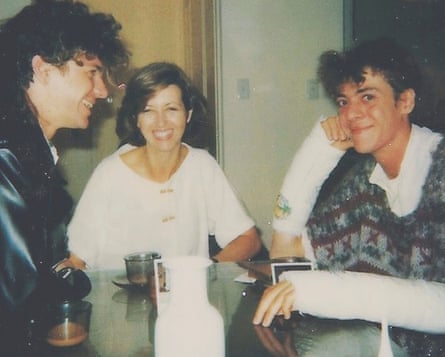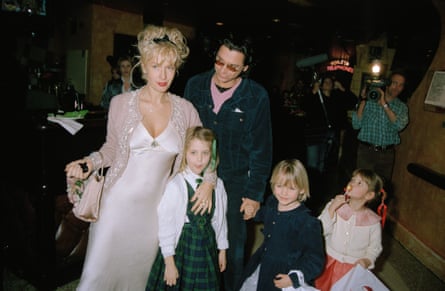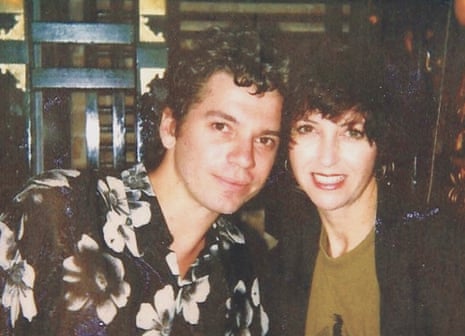Everything about Michael looked different, his sister thought. He was paler, duller in the eyes, more slumped in the shoulders. Even his Byronic curls seemed to have lost their bounce. It brought to mind the Emily Dickinson poem After Great Pain, a Formal Feeling Comes:
The Feet, mechanical, go round –
A Wooden way
Of Ground, or Air, or Ought –
Regardless grown,
A Quartz contentment, like a stone –
It was 1996, the day before Tina Hutchence’s wedding. Earlier, in a fax to her, he’d explained the “unmitigated hell” he was going through, “with the press, the police, a fire, four burglaries, litigation … we have seven or eight writs on our hands”. Two months later, a police raid would find drugs in the house he shared with Paula Yates.
The story of Michael’s final years under siege from the paparazzi has been well documented. Tina was moved to write the book Michael: My Brother, Lost Boy of INXS because she felt that he had become a tragic caricature in the hands of other biographers – and she’s counted at least nine. Hers includes an introduction about the Paradise Papers and Michael’s missing millions, and written tributes from several of Michael’s friends.
Her co-writer is Jen Jewel Brown, who began her career in music journalism at the Daily Planet in the early 70s, and who sang backing vocals on Speed Kills, the track Michael made with Cold Chisel’s Don Walker for the 1982 soundtrack of Freedom.

Guardian Australia: You and your mother, Patricia Glassop, wrote a biography about Michael – Just a Man – that was published in 2001. Have new things come to light?
Tina Hutchence: There were things that I wanted to write about in the last book and I couldn’t because my [late] mother didn’t want to, but the main new thing is the traumatic brain injury [Hutchence was shoved by a taxi driver in 1992 and fractured his skull].
While he lost his sense of smell and taste, I don’t believe he was told much else about what could happen. He was put on Prozac and told he’d get through the headaches. But there has been so much written about TBIs in the US over the last five years, looking at football players and boxers. It made sense to me the more I read, because Michael’s personality changed dramatically. I’ve now done a couple of podcasts about it in the States and I intend to continue to working along those lines.
By the time he was 16, Michael had lived in Australia, Hong Kong and the US, having to adapt to each. These seem like the perfect formative years for a rock star in waiting.
He was always very interested in what was going on around him. In Hong Kong, especially in those days, business is done over pleasure – you go to dinner parties and cocktail parties and deals are made. But if you were living there in those times, conversation was always about how our lives were going to change. It obviously made quite an impression on him when he was so young, watching these riots [the 1967 leftist riots against colonial rule].
Michael’s father, Kell, was impulsive and charming, making life-changing decisions for the family on a whim and without consultation. Very lead singer-esque.
Yeah, he was. Very charming and the life of the party. He respected women but he also felt it was the man who rules everything. My mother was exceptional in that she had already gone through a divorce and made something of herself, becoming one of the few make-up artists in Australia in the 60s. She was her own person, so it was a tough relationship.

There then came a traumatic split, with Patricia covertly departing for the US with Michael, leaving his brother Rhett with Kell. This was just a year before no-fault divorce was an option.
Women were stuck; it was very difficult getting a divorce. It wasn’t just traumatic for Michael, but also my mother. Every time somebody writes about that they tend to write it as though my mother just kidnapped him and took him off to the States against his will, but it was something she talked to him about and they planned it. At first, everything was a rush and exciting, but after it settled down they both realised what they’d done. My mother, especially – I don’t think she ever forgave herself for leaving Rhett.
Michael’s life became a circus amid the custody battle between his partner Paula Yates and her ex-husband, Bob Geldof. The UK had hit peak paparazzi; Princess Diana died three months before him, having been harassed relentlessly. And yet, as you observe, there was an odd attitude in the UK that celebrities brought it on themselves – by wanting to be famous.
I think you can always tell if an article is from a UK newspaper, just from reading it. He’d always had such a great relationship with the press. They didn’t bother him, or didn’t even realise it was him. I had observed him walking around in Paris, LA and Australia and people would just say, “Oh hi, I caught your show the other night,” and he’d say, “Thanks mate,” shake their hand and walk on. But when all that exploded in London, he was absolutely beside himself. I was once told that with the tabloids they’ve got to have a good guy and a bad guy. What role could he take if Bob [known in the UK tabloids as “Saint Bob”] was on the other side?

You express frustration that no one in management or the touring party talked to the family about their concerns during the final tour in 1997. We would see the same pressure have a fatal impact on Amy Winehouse and Avicii.
Yes. Absolutely. “Let’s push on.” Doesn’t matter if he’s forgetting his own lyrics. That was very upsetting. I found out more in reading some of the statements to the police. The fact that the manager wrote Michael a letter saying she was very worried about him, and what can they do? Well obviously the thing to do is call off the tour that he didn’t want to be on, but they didn’t – it was on with the show.
Do you hope this book will be a full stop?
Oh, I do. As well as helping the traumatic brain injury community, I think this is something for Michael’s legacy. He deserves it.
There is one more thing to come though, the documentary from Richard Lowenstein (who made the movie Dogs in Space, starring Michael).
I’ve been working with him on that, supplying photographs and pieces of film and doing some voiceover. I think it’s going to be brilliant.
